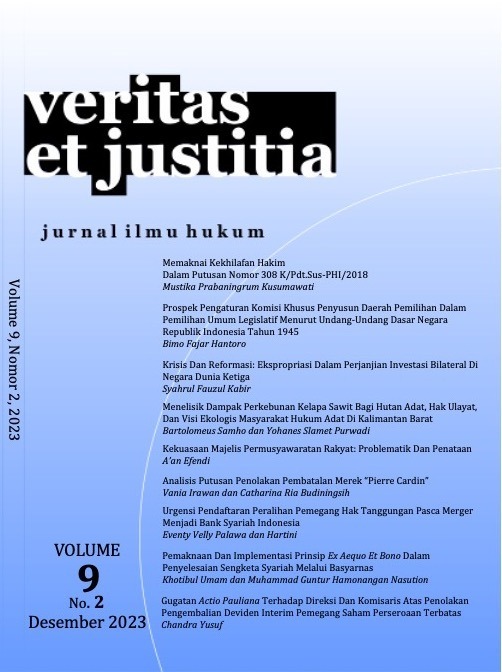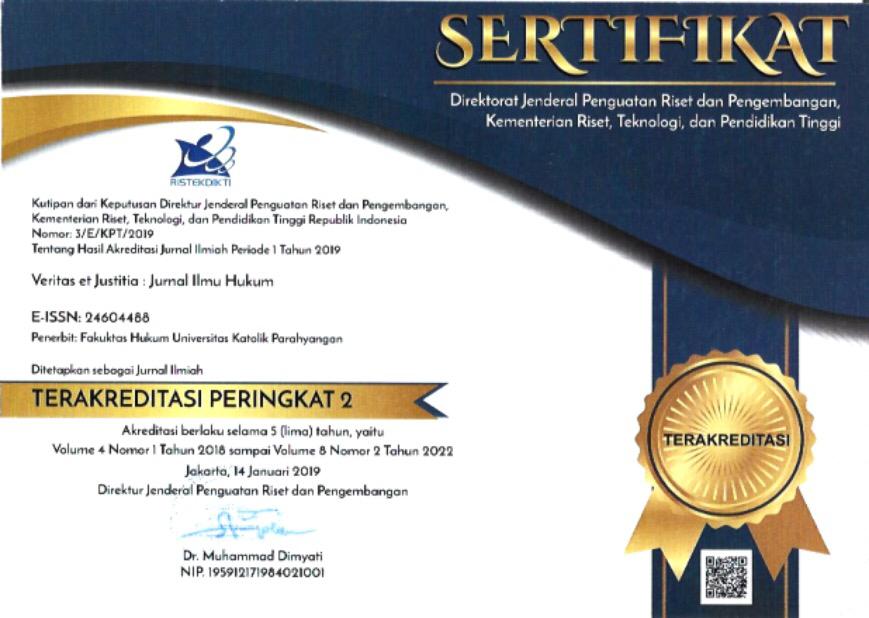PROSPEK PENGATURAN KOMISI KHUSUS PENYUSUN DAERAH PEMILIHAN DALAM PEMILIHAN UMUM LEGISLATIF MENURUT UNDANG-UNDANG DASAR NEGARA REPUBLIK INDONESIA TAHUN 1945
DOI:
https://doi.org/10.25123/vej.v9i2.5837Kata Kunci:
electoral district; boundary commission; electoral management bodies; legislative election.Abstrak
Electoral redistricting institution has a critical role in determining whether a proportional arrangement of electoral districts can be achieved. In Indonesia, there has been a disparity between electoral districts established by the House of Representatives (DPR) and the General Elections Commission (KPU), especially during the 2019 DPR Election. Using doctrinal and socio-legal approaches, this paper aimsto evaluate the prospect of establishing a separate boundary commission in accordance with the 1945 Constitution. The findings suggest that the establishment of a boundary commission as part of electoral management bodies is normatively feasible. However, it must meet the institutional requirements of being national, permanent, and independent. Independency has to be construed as the institution being impartial. By conferring the boundary delimitation authority to a boundary commission, not only would KPU's burden be reduced, it could also better ensure that the delimitation process adheres to the delimitation principles.
Referensi
Buku:
Alan Wall et. al., Desain Penyelenggaraan Pemilu: Buku Pedoman International IDEA, International IDEA, Stockholm, 2016
Andrew Reynolds, Ben Reilly & Andrew Ellis, Desain Sistem Pemilu: Buku Panduan Baru International IDEA, International IDEA, Stockholm, 2016
Ani Purwati, Metode Penelitian Hukum: Teori & Praktek, Jakad Media Publishing, Surabaya, 2020
Jimly Asshiddiqie, Konsolidasi dan Perkembangan Lembaga Negara Pasca Reformasi, Sekretariat Jenderal dan Kepaniteraan Mahkamah Konstitusi, Jakarta, 2006
Jimly Asshiddiqie, Pengantar Ilmu Hukum Tata Negara, RajaGrafindo Persada, Jakarta, 2009
Khairul Fahmi, Pemilihan Umum dalam Transisi Demokrasi, Rajawali Pers, Depok, 2016
Lisa Handley et. al., Delimitation Equity Project: Resource Guide, International Foundation for Electoral Systems, Arlington, 2006
Michel L. Balinski & H. Peyton Young, Fair Representation: Meeting the Ideal of One Man, One Vote, Brookings Institution Press, Washington D.C., 2001
Peter Mahmud Marzuki, Penelitian Hukum: Edisi Revisi, Prenada Media Group, Jakarta, 2017
Pipit R. Kartawidjaja dan M. Faishal Aminuddin, Demokrasi Elektoral Bagian I: Perbandingan Sistem dan Metode dalam Kepartaian dan Pemilu, Sindikasi Indonesia, Surabaya, 2014
Saldi Isra dan Khairul Fahmi, Pemilihan Umum Demokratis: Prinsip-Prinsip dalam Konstitusi Indonesia, Rajawali Pers, Depok, 2019
Soerjono Soekanto, Pengantar Penelitian Hukum, Universitas Indonesia Press, Jakarta, 2006
Soerjono Soekanto dan Sri Mamudji, Penelitian Hukum Normatif: Suatu Tinjauan Umum, RajaGrafindo Persada, Jakarta, 2007
Steve Bickerstaff, Election Systems and Gerrymandering Worldwide, Springer, Cham, 2020
Jurnal:
Alboin Pasaribu, Tafsir Konstitusional atas Kemandirian Penyelenggara Pemilu dan Pilkada, 16 Jurnal Konstitusi 416, 2019
Colin Rallings et. al., Redistricting Local Governments in England: Rules, Procedures, and Electoral Outcomes, 4 State Politics and Political Quarterly 470, 2004
David Schleicher, The Boundary Problem and the Changing Case Against Deference in Election Law Cases: Lessons from Local Government Law, 15 Election Law Journal 247, 2016
Dian Agung Wicaksono, Reformulasi Metode Konversi Suara Menjadi Kursi Dalam Pemilihan Umum Legislatif di Indonesia, 3 Jurnal Rechtsvinding 69, 2014.
Ferran Martinez I Coma & Ignacio Lago, Gerrymandering in Comparative Perspective, 24 Party Politics 99, 2016
Heather K. Gerken, Getting from Here to There in Redistricting Reform, 5 Duke Journal of Constitutional Law and Public Policy 1, 2010
Lusy Liany, Kedudukan dan Kewenangan Bawaslu dalam Struktur Lembaga Negara Indonesia, 15 Lex Jurnalica 308, 2018
Michael Gallagher, Proportionality, Disproportionality and Electoral Systems, 10 Electoral Studies 33, 1991
Michael P. McDonald, A Comparative Analysis of Redistricting Institutions in the United States, 2001–02, 4 State Politics and Political Quarterly 371, 2004.
Raymond La Raja, Redistricting: Reading Between the Line, 12 Annual Review of Political Science 203, 2009
Rein Taagepera & Markku Laakso, Proportionality Profiles of West European Electoral Systems, 8 European Journal of Political Research 423, 1980
Riri Nazriyah, Kemandirian Penyelenggara Pemilihan Umum (Kajian terhadap Putusan Mahkamah Konstitusi No. 81/PUU-IX/2011), 18 Jurnal Hukum Ius Quia Iustum 107, 2011
Antologi:
Michael P. McDonald, United States Redistricting: A Comparative Look at the 50 States, dalam Lisa Handley & Bernard Grofman, Redistricting in Comparative Perspective, Oxford University Press, New York, 2008.
Lisa Handley, A Comparative Survey of Structures and Criteria for Boundary Delimitation, dalam Lisa Handley & Bernard Grofman, Redistricting in Comparative Perspective, Oxford University Press, New York, 2008.
Tugas Akhir:
Bimo Fajar Hantoro, Dualisme Kewenangan Pembentukan Daerah Pemilihan terhadap Prinsip Proporsionalitas dalam Pemilihan Umum Legislatif Tahun 2019, Skripsi Program Sarjana Ilmu Hukum Fakultas Hukum Universitas Gadjah Mada, Yogyakarta, 2020.
Peraturan Perundang-undangan:
Delimitation Act of India.
Undang-Undang Dasar Negara Republik Indonesia Tahun 1945.
Undang-Undang Nomor 3 Tahun 1999 tentang Pemilihan Umum (Lembaran Negara Republik Indonesia Tahun 1999 Nomor 23, Tambahan Lembaran Negara Republik Indonesia Nomor 3725).
Undang-Undang Nomor 12 Tahun 2003 tentang Pemilihan Umum Anggota Dewan Perwakilan Rakyat, Dewan Perwakilan Daerah, dan Dewan Perwakilan Rakyat Daerah (Lembaran Negara Republik Indonesia Tahun 2003 Nomor 37, Tambahan Lembaran Negara Republik Indonesia Nomor 4277).
Undang-Undang Nomor 10 Tahun 2008 tentang Pemilihan Umum Anggota Dewan Perwakilan Rakyat, Dewan Perwakilan Daerah, dan Dewan Perwakilan Rakyat Daerah (Lembaran Negara Republik Indonesia Tahun 2008 Nomor 51, Tambahan Lembaran Negara Republik Indonesia Nomor 4836).
Undang-Undang Nomor 8 Tahun 2012 tentang Pemilihan Umum Anggota Dewan Perwakilan Rakyat, Dewan Perwakilan Daerah dan Dewan Perwakilan Rakyat Daerah (Lembaran Negara Republik Indonesia Tahun 2012 Nomor 117, Tambahan Lembaran Negara Republik Indonesia Nomor 5316).
Undang-Undang Nomor 7 Tahun 2017 tentang Pemilihan Umum (Lembaran Negara Republik Indonesia Tahun 2017 Nomor 182, Tambahan Lembaran Negara Republik Indonesia Nomor 6109).
Peraturan Komisi Pemilihan Umum Nomor 16 Tahun 2017 tentang Penataan Daerah Pemilihan dan Alokasi Kursi Anggota Dewan Perwakilan Rakyat Daerah Kabupaten/Kota Dalam Pemilihan Umum (Berita Negara Republik Indonesia Tahun 2017 Nomor 1870).
Putusan Pengadilan:
Putusan Mahkamah Konstitusi Nomor 11/PUU-VIII/2010 perihal Pengujian Undang-Undang Nomor 22 Tahun 2007 tentang Penyelenggara Pemilihan Umum terhadap Undang-Undang Dasar Negara Republik Indonesia 1945.
Putusan Mahkamah Konstitusi Nomor 81/PUU-IX/2011 perihal Pengujian Undang-Undang Nomor 15 Tahun 2011 tentang Penyelenggara Pemilihan Umum terhadap Undang-Undang Dasar Negara Republik Indonesia Tahun 1945.
Putusan Mahkamah Konstitusi Nomor 96/PUU-X/2012 perihal Pengujian Undang-Undang Nomor 8 Tahun 2012 tentang Pemilihan Umum Anggota Dewan Perwakilan Rakyat, Dewan Perwakilan Daerah, dan Dewan Perwakilan Rakyat Daerah terhadap Undang-Undang Dasar Negara Republik Indonesia Tahun 1945.
Putusan Mahkamah Konstitusi Nomor 80/PUU-XX/2022 perihal Pengujian Undang-Undang Nomor 7 Tahun 2017 tentang Pemilihan Umum terhadap Undang-Undang Dasar Negara Republik Indonesia 1945.
##submission.downloads##
Diterbitkan
Terbitan
Bagian
Lisensi
Hak Cipta (c) 2023 Bimo Fajar Hantoro

Artikel ini berlisensi Creative Commons Attribution-NonCommercial 4.0 International License.
Authors who publish with this journal agree to the following terms:
Authors retain copyright and grant the journal right of first publication with the work simultaneously licensed under a Creative Commons Attribution License that allows others to share the work with an acknowledgement of the work's authorship and initial publication in this journal.
Authors are able to enter into separate, additional contractual arrangements for the non-exclusive distribution of the journal's published version of the work (e.g., post it to an institutional repository or publish it in a book), with an acknowledgement of its initial publication in this journal.
Authors are permitted and encouraged to post their work online (e.g., in institutional repositories or on their website) prior to and during the submission process, as it can lead to productive exchanges, as well as earlier and greater citation of published work.
The Journal allow the author(s) to hold the copyright and to retian publishing rights without restrictions.










